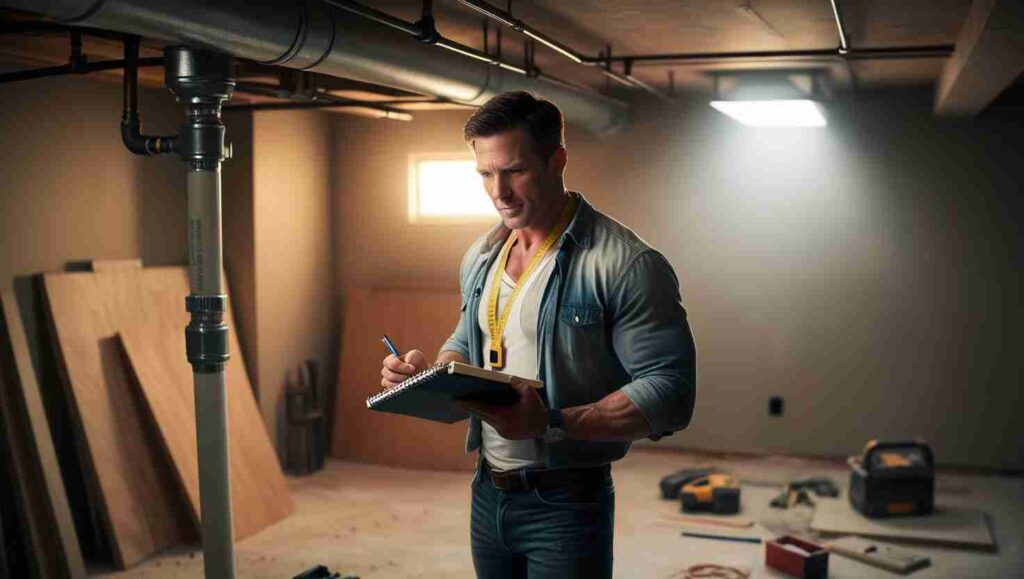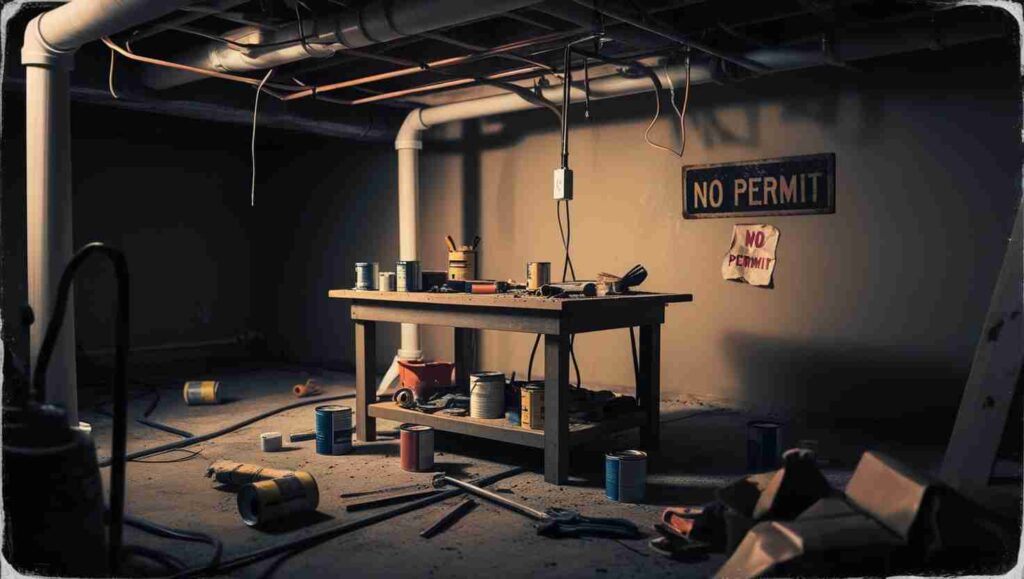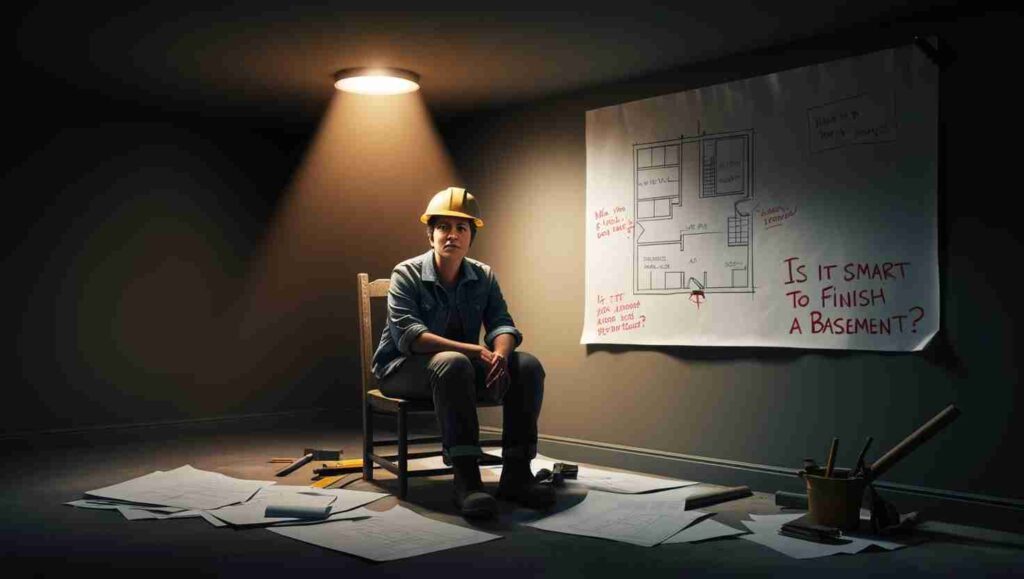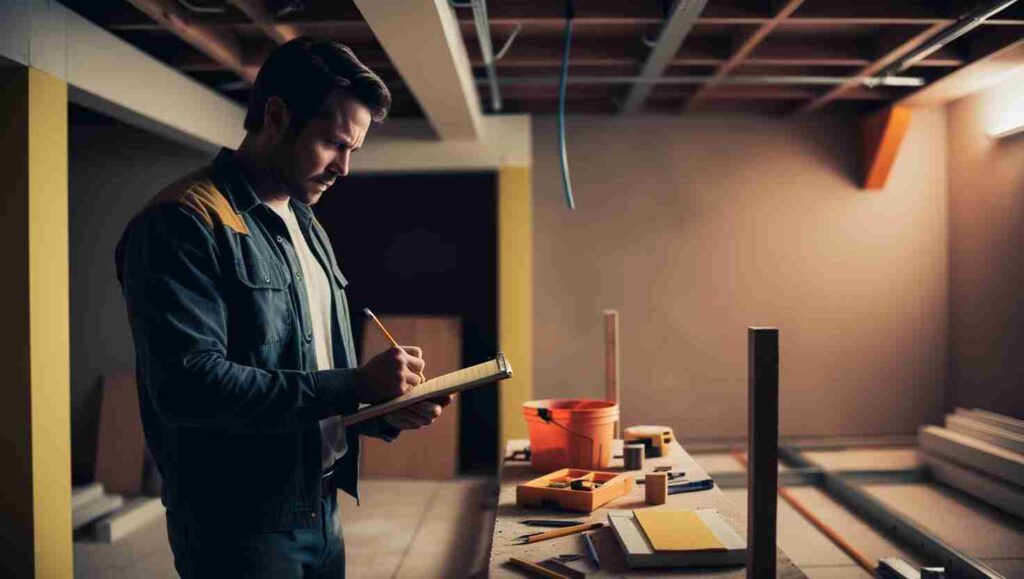Basement Finishing in 10 Milestones, A Step-by-Step Guide
"Transform Your Basement: Key Steps to Achieve the Perfect Finish"

Basement Finishing into a functional, inviting space is one of the best ways to maximize your home’s potential. Whether you envision a cozy family room, an extra bedroom, or a home office, basement finishing offers endless possibilities. With a well-planned basement remodeling project, you can transform an underutilized area into a vibrant extension of your living space.
Basement renovation is more than just adding walls and flooring; it’s about creating a seamless transition from your main living areas to your newly finished space. From initial basement upgrades to comprehensive basement conversions, each step of the process brings you closer to achieving a personalized, stylish environment that suits your lifestyle.
Basement completion is a rewarding investment, increasing both your home’s functionality and its market value. A thoughtful basement improvement plan considers not just aesthetics but also practical elements like insulation, moisture control, and lighting. As you embark on your basement revamp, you’ll discover that the possibilities are vast, whether you’re opting for a modern design or a classic finish.
Is basement finishing a good investment?
How much to finish a basement?
Is finishing a basement worth the money?
Can i finish basement without permit?
How much does it cost to finish a basement in DC?
What is the most expensive part of finishing a basement?
How do you finish a basement on a budget?
Will a finished basement increase home value?
When should you not finish a basement?
Is it smart to finish a basement?
Basement Enhancement, Is basement finishing a good investment?
Yes, basement finishing is generally considered a good investment for several reasons:
1. Increases Home Value:
- Finishing your basement can significantly increase the overall value of your home. A well-done basement renovation often has a high return on investment (ROI), sometimes recouping 70% or more of the costs when you sell your home.
2. Adds Usable Living Space:
- A finished basement adds valuable square footage to your home, providing additional living space that can be used for a variety of purposes, such as a guest room, home office, entertainment area, or gym. This makes your home more functional and attractive to potential buyers.
3. Enhances Marketability:
- Homes with finished basements often stand out in the real estate market. Buyers are typically drawn to homes that offer extra, ready-to-use space without the need for additional renovation work.
4. Offers Rental Income Potential:
- If local regulations allow, a finished basement can be converted into a rental unit, providing an additional source of income. This can be particularly beneficial in areas with high demand for rental properties.
5. Improves Energy Efficiency:
- Basement finishing often includes adding insulation, which can help improve your home’s overall energy efficiency. This can lead to lower heating and cooling costs, adding another layer of financial benefit.
6. Customizable to Your Needs:
- Whether you need more storage, a dedicated space for hobbies, or a place for family gatherings, a finished basement can be customized to meet your specific needs, enhancing your overall quality of life.
Overall, basement finishing is a good investment that not only boosts your home’s value but also enhances its functionality and appeal.
Basement Completion, How much to finish a basement?

The cost to finish a basement can vary widely depending on several factors, including the size of the basement, the complexity of the design, the materials used, and your location. Here’s a general breakdown:
1. Basic Basement Finishing:
- Cost: $7,000 to $20,000
- What’s Included: This budget typically covers basic framing, insulation, drywall, lighting, and flooring. It might include a simple room layout with minimal custom features.
2. Mid-Range Basement Finishing:
- Cost: $20,000 to $45,000
- What’s Included: At this level, you can expect higher-quality finishes, additional rooms (like a bedroom or office), upgraded flooring options, a small bathroom, and enhanced lighting and electrical work.
3. High-End Basement Finishing:
- Cost: $45,000 to $100,000+
- What’s Included: High-end finishes often include custom cabinetry, a full bathroom, a home theater, a wet bar, or a kitchenette, along with luxury flooring and advanced lighting systems. This budget might also include structural changes, additional plumbing, and specialized features.
4. Additional Costs to Consider:
- Permits: Depending on your location, building permits can add a few hundred to a few thousand dollars to your project.
- Plumbing and Electrical: Installing or upgrading plumbing and electrical systems can add $1,000 to $5,000 or more, depending on the complexity.
- Moisture Control: Ensuring your basement is dry before finishing may involve waterproofing, which can cost $2,000 to $10,000.
- Labor Costs: If you hire a contractor, labor can account for 40% to 60% of the total cost, depending on the project’s complexity and local labor rates.
5. Geographical Variations:
- Location Matters: Costs can vary based on where you live. Urban areas or regions with a higher cost of living may see higher overall costs compared to rural areas.
Overall, the average cost to finish a basement typically ranges between $20,000 and $45,000, but your specific project could fall anywhere within or outside this range depending on your choices and needs.
Basement Upgrade, Is finishing a basement worth the money?
Finishing a basement is often worth the money for several reasons:
1. Increases Home Value:
- A finished basement adds significant value to your home. It increases the usable square footage, which can boost the market price. On average, homeowners can expect to recoup 70% or more of their investment when selling.
2. Expands Living Space:
- A finished basement provides extra living space without the need for an expensive addition. Whether you use it as a family room, guest suite, home office, or entertainment area, it makes your home more functional and comfortable.
3. Enhances Market Appeal:
- Homes with finished basements are more attractive to potential buyers. The additional space is seen as a bonus, making your home stand out in the real estate market.
4. Rental Income Potential:
- If your local regulations allow, a finished basement can be converted into a rental unit. This can generate additional income, helping to offset the cost of the renovation over time.
5. Customizable Space:
- A finished basement can be tailored to meet your specific needs, whether that’s creating a home theater, gym, or playroom. This flexibility adds to your overall enjoyment of your home.
6. Improved Energy Efficiency:
- Basement finishing often includes adding insulation and improving moisture control, which can lead to lower energy bills and a more comfortable home environment.
7. Long-Term Benefits:
- Beyond immediate financial returns, finishing your basement adds long-term benefits in terms of living comfort and potential uses, making it a worthwhile investment for many homeowners.
In summary, finishing a basement is generally worth the money, offering both immediate and long-term benefits in terms of increased home value, additional living space, and enhanced market appeal.
Basement Renovation, Can i finish basement without permit?

In most areas, you are required to obtain a permit to finish a basement. Here’s why getting a permit is important:
1. Legal Compliance:
- Building Codes: Finishing a basement without a permit can violate local building codes. These codes are in place to ensure that construction is safe and up to standard.
- Penalties: If your project is discovered without a permit, you may face fines, be required to halt construction, or even undo the work to comply with regulations.
2. Safety:
- Inspection: A permit typically requires inspections at various stages of the project, ensuring that electrical, plumbing, and structural work meet safety standards.
- Insurance: Unpermitted work might not be covered by your homeowner’s insurance, leaving you vulnerable if something goes wrong.
3. Home Value and Resale:
- Resale Value: Unpermitted work can complicate the sale of your home. Potential buyers may be wary, and you might have to disclose the lack of permits, which can lower your home’s value.
- Mortgage and Appraisal Issues: Lenders and appraisers often require proof of permits for major renovations, and the lack of one could delay or even derail a sale.
4. Long-Term Costs:
- Future Renovations: If you plan to do more work in the future, you may face additional challenges or costs if previous work was done without permits.
- Correcting Issues: If unpermitted work is found to be non-compliant, you may need to pay to bring it up to code, which can be expensive.
Exceptions and Local Variations:
- Minor Work: In some cases, minor cosmetic changes might not require a permit, but this varies by location.
- Local Laws: Always check with your local building department to understand the specific requirements in your area.
In summary, while it might be tempting to skip the permit process to save time or money, doing so can lead to significant legal, financial, and safety risks. It’s generally best to obtain the necessary permits before finishing your basement.
Basement Finishing, How much does it cost to finish a basement in DC?
The cost to finish a basement in Washington, D.C., can vary widely depending on factors such as the size of the basement, the complexity of the project, the materials used, and the specific features you want to include. Here’s a general breakdown:
1. Basic Basement Finishing:
- Cost: $20,000 to $40,000
- What’s Included: Basic framing, insulation, drywall, standard flooring, and basic lighting. This level typically covers a simple layout without extensive custom features.
2. Mid-Range Basement Finishing:
- Cost: $40,000 to $70,000
- What’s Included: Higher-quality finishes, additional rooms (like a bedroom or office), upgraded flooring, a small bathroom, enhanced lighting, and some custom features like built-in shelving.
3. High-End Basement Finishing:
- Cost: $70,000 to $150,000+
- What’s Included: Luxury finishes, custom cabinetry, a full bathroom, a home theater, a wet bar or kitchenette, high-end flooring, advanced lighting systems, and possibly structural changes or additions like egress windows.
Factors Influencing Cost:
- Permits and Regulations: Washington, D.C., has specific building codes and permit requirements that can add to the overall cost. Permit fees can range from a few hundred to a few thousand dollars.
- Labor Costs: Labor is generally more expensive in D.C. compared to other areas, which can significantly impact the total cost.
- Material Costs: The choice of materials (e.g., flooring, countertops, fixtures) will greatly influence the final price. High-end materials will increase costs.
- Utility Upgrades: If your basement requires new plumbing, electrical work, or HVAC upgrades, this can add $5,000 to $15,000 or more to the project.
Local Variations:
- Neighborhood Impact: Costs can also vary depending on the neighborhood. More affluent areas may see higher labor and material costs due to demand and the expectation of higher-end finishes.
Custom Features:
- Customization: If you plan to add specialized features like a home gym, wine cellar, or smart home technology, these can significantly increase the budget.
Overall, in Washington, D.C., you can expect to spend anywhere from $20,000 to $150,000 or more, depending on the scope and quality of the project. It’s advisable to get multiple quotes from local contractors to get a more precise estimate tailored to your specific needs.
Basement Build-Out, What is the most expensive part of finishing a basement?
The most expensive part of finishing a basement is typically the labor costs, which can account for 40% to 60% of the total project budget. However, within the various components of the project, specific elements can drive up costs significantly:
1. Framing and Drywall Installation:
- Cost Impact: Creating new walls and installing drywall can be one of the more expensive aspects of basement finishing, particularly if your design involves multiple rooms or complex layouts.
2. Plumbing and Electrical Work:
- Cost Impact: Installing or upgrading plumbing and electrical systems is another major expense. This includes adding new bathrooms, installing a wet bar, running wiring for lighting and outlets, and setting up HVAC systems.
3. Flooring:
- Cost Impact: Depending on the material you choose, flooring can range from moderately expensive to very costly. High-end materials like hardwood or luxury vinyl can significantly increase the budget, especially if the basement is large.
4. Custom Features:
- Cost Impact: Adding custom features like a home theater, gym, wine cellar, or kitchenette can dramatically increase costs. These features often require specialized labor, higher-end materials, and additional plumbing or electrical work.
5. Waterproofing and Moisture Control:
- Cost Impact: Ensuring your basement is dry and protected from moisture is crucial. Waterproofing measures like sump pumps, drainage systems, and sealing can be expensive, but they’re essential for preventing future damage.
6. Permits and Inspections:
- Cost Impact: Obtaining the necessary permits and having the project inspected at various stages can add to the overall expense. In some areas, these costs can be substantial.
7. Finishes and Fixtures:
- Cost Impact: The choice of finishes and fixtures, such as lighting, cabinetry, countertops, and bathroom fixtures, can also significantly impact the total cost. High-end options will raise the budget.
In summary, while labor is generally the single largest cost, the specific elements like plumbing, electrical work, custom features, and waterproofing can also represent substantial portions of the budget, depending on the complexity and quality of the materials chosen.
Basement Improvement, How do you finish a basement on a budget?

Finishing a basement on a budget is possible with careful planning and smart choices. Here are some tips to help you keep costs down while still achieving a functional and attractive space:
1. Plan Ahead
- Set a Budget: Determine how much you’re willing to spend and stick to it. Include a small contingency for unexpected expenses.
- Prioritize Needs vs. Wants: Focus on essential elements first, like flooring and basic lighting, and save luxury items for later if your budget allows.
2. Do It Yourself
- DIY Where Possible: If you have the skills, consider doing some of the work yourself, such as painting, installing flooring, or hanging drywall. This can save a significant amount on labor costs.
- Hire Professionals for Complex Work: For plumbing, electrical, or structural work, it’s often best to hire professionals to ensure the job is done safely and up to code.
3. Choose Affordable Materials
- Budget-Friendly Flooring: Opt for cost-effective flooring options like laminate, vinyl, or carpet tiles instead of hardwood or ceramic tile.
- Basic Finishes: Choose simple, durable finishes for walls, ceilings, and fixtures. Consider using standard drywall and a basic drop ceiling to save money.
- Recycled or Repurposed Materials: Look for recycled or repurposed materials like reclaimed wood or second-hand furniture to cut costs.
4. Keep the Layout Simple
- Open Concept: A more open layout requires less framing and fewer walls, reducing material and labor costs.
- Minimal Plumbing and Electrical Work: Keep plumbing and electrical work to a minimum by placing bathrooms and wet bars near existing lines.
5. Focus on Insulation and Moisture Control
- Essential Insulation: Proper insulation is key for comfort and energy efficiency, so invest in quality insulation to avoid higher heating and cooling costs in the future.
- Basic Moisture Control: Ensure the basement is waterproofed to prevent moisture issues. Simple measures like sealing cracks and installing a dehumidifier can be cost-effective.
6. Simplify the Design
- Basic Lighting: Use basic, energy-efficient lighting options like LED fixtures or simple track lighting. Avoid expensive custom lighting setups.
- Paint Instead of Paneling: A fresh coat of paint can transform a space without the need for expensive wall treatments.
7. Consider Phased Upgrades
- Start Small: Begin with essential areas and gradually add features over time as your budget allows. For example, finish the main living area first, then add a bathroom or kitchenette later.
- Future-Proof Wiring and Plumbing: If you plan to add features in the future, consider pre-wiring or pre-plumbing while the walls are open, which can save money down the line.
8. Shop Sales and Discounts
- Look for Deals: Purchase materials during sales or from discount retailers. Consider buying in bulk for larger savings.
- Use Coupons and Rebates: Take advantage of coupons, rebates, and promotions from home improvement stores.
9. Avoid Custom Work
- Stick to Standard Sizes: Custom-built cabinetry, windows, and doors can quickly add up. Opt for standard sizes and ready-made options to save money.
10. Get Multiple Quotes
- Compare Contractors: If you’re hiring help, get multiple quotes from contractors to ensure you’re getting the best price. Negotiate where possible to stay within budget.
By following these strategies, you can finish your basement on a budget without sacrificing quality or style.
Basement Remodeling, Will a finished basement increase home value?
Yes, a finished basement can increase the value of your home. Here’s how:
1. Increased Usable Space:
- Extra Square Footage: A finished basement adds usable living space, which can make your home more appealing to potential buyers. More square footage generally translates to a higher market value.
2. Enhanced Functionality:
- Additional Rooms: A finished basement can be transformed into functional areas such as extra bedrooms, a home office, a gym, or a recreational space. These features can attract buyers looking for versatile living areas.
3. Improved Market Appeal:
- Buyer Preference: Many buyers look for homes with finished basements because they offer more options for customization and immediate use. A well-done basement can set your home apart from others on the market.
4. Increased Home Value:
- Return on Investment: On average, homeowners can expect to recoup a significant portion of their investment in basement finishing when selling their home. The return on investment typically ranges from 70% to 85%, depending on the quality of the work and local real estate conditions.
5. Rental Income Potential:
- Income Opportunity: If local regulations allow, a finished basement can be converted into a rental unit, providing additional income that can make the property more attractive to investors.
6. Better Utilization of Space:
- Maximized Property Value: Finishing a basement effectively maximizes the full potential of your property. Utilizing every part of the home can lead to a higher appraisal value.
7. Modernization and Upgrades:
- Updated Features: A finished basement often includes modern upgrades such as improved insulation, energy-efficient lighting, and updated finishes. These upgrades can enhance the overall appeal and value of your home.
Considerations:
- Quality of Finish: The quality of the finishing work plays a significant role in the increase in value. High-quality materials and craftsmanship will have a better impact than basic or subpar work.
- Local Market Trends: The effect on home value can vary based on local real estate trends and market demands. In some areas, a finished basement may offer a substantial increase in value, while in others, it may have a more modest impact.
In summary, a finished basement can increase your home’s value by adding functional living space, enhancing market appeal, and providing additional features that prospective buyers find attractive.
Basement Conversion, When should you not finish a basement?

Deciding whether to finish a basement involves evaluating several factors to ensure that the investment is worthwhile and practical. Here are situations when you might reconsider finishing a basement:
1. Severe Moisture Issues:
- Persistent Water Problems: If your basement has chronic water leakage or high humidity levels, finishing it could lead to significant problems such as mold growth, structural damage, and health issues. Addressing these moisture issues first is crucial.
2. Poor Foundation or Structural Integrity:
- Foundation Issues: If the foundation of your home is compromised or has significant cracks, finishing the basement could exacerbate these problems. Ensuring the structural integrity of the foundation is essential before proceeding with any finishing work.
3. Low Ceiling Height:
- Inadequate Ceiling Space: If your basement has a low ceiling height that makes it feel cramped or uncomfortable, it may not be practical or appealing to finish. Low ceilings can limit the functionality and aesthetic appeal of the space.
4. Inadequate Egress:
- Lack of Emergency Exits: For safety reasons, many building codes require a finished basement to have proper egress (an emergency exit) in case of fire or other emergencies. If adding egress windows or doors is not feasible, it might not be worth finishing the basement.
5. Significant Cost Concerns:
- High Costs vs. Home Value: If the cost of finishing the basement significantly exceeds the potential increase in your home’s value, it may not be a financially sound decision. Assess whether the investment aligns with your budget and goals.
6. Unfavorable Local Market Conditions:
- Market Trends: In some markets, a finished basement may not add much value to the home, or there may be less demand for such features. Research local market trends to determine if finishing the basement will provide a good return on investment.
7. Limited Usability:
- Functionality Concerns: If the space is small or has irregular layouts that limit its functionality, finishing it may not yield a practical or enjoyable space. Consider how the finished basement will be used and if it will meet your needs.
8. Permitting and Code Compliance Issues:
- Difficulties with Regulations: If obtaining the necessary permits or meeting building codes is overly complex or costly, it may not be worth the hassle. Ensure you can comply with local regulations before proceeding.
9. Health and Safety Concerns:
- Environmental Hazards: If there are environmental hazards such as radon, asbestos, or lead, they need to be addressed before finishing the basement. These issues can pose serious health risks.
10. Short-Term Plans to Move:
- Selling Soon: If you plan to sell your home in the near future, the cost of finishing the basement might not provide enough value to justify the expense. Consider whether the investment aligns with your timeline and home-selling strategy.
In summary, finishing a basement should be carefully considered based on factors such as moisture problems, structural integrity, ceiling height, and local market conditions. Address any underlying issues and weigh the costs and benefits to determine if it’s a worthwhile investment.
Basement Revamp, Is it smart to finish a basement?
Finishing a basement can be a smart move, but it depends on several factors. Here’s a look at the advantages and considerations to help you decide if it’s the right choice for you:
Advantages of Finishing a Basement:
- Increased Living Space:
- Functionality: A finished basement adds usable square footage to your home, which can be transformed into additional bedrooms, a home office, a gym, or a recreational area. This can enhance your family’s lifestyle and comfort.
- Improved Home Value:
- Property Value: Finishing a basement can increase your home’s market value. On average, you can recoup a significant portion of the investment, often between 70% to 85%, depending on the quality of the work and local real estate conditions.
- Enhanced Market Appeal:
- Buyer Attraction: Homes with finished basements often attract more buyers and can stand out in a competitive market. Potential buyers appreciate the added functionality and versatility of the space.
- Increased Rental Income Potential:
- Income Generation: If local regulations allow, a finished basement can be converted into a rental unit, providing additional income. This can be particularly advantageous if you plan to rent out the space.
- Utilization of Underused Space:
- Maximized Space: Finishing a basement makes use of an often underutilized area of the home, enhancing overall functionality and efficiency.
Considerations:
- Cost vs. Benefit:
- Expense: Finishing a basement can be costly, with expenses ranging from $20,000 to over $100,000, depending on the scope of the project. Weigh the potential increase in home value against the investment required.
- Moisture and Waterproofing:
- Potential Issues: Address any moisture problems before finishing the basement. Waterproofing and addressing potential mold issues are essential to prevent future damage.
- Structural Concerns:
- Foundation Integrity: Ensure the basement’s foundation is in good condition. Significant structural issues should be resolved before starting the finishing process.
- Local Market Conditions:
- Real Estate Trends: Research local market trends to determine if a finished basement will provide a good return on investment. In some areas, the added value may be minimal.
- Permits and Regulations:
- Compliance: Ensure you obtain the necessary permits and comply with local building codes. Failing to do so can lead to complications or additional costs.
- Short-Term Plans:
- Moving Plans: If you plan to move soon, the cost of finishing a basement may not be justified. Consider whether the investment aligns with your long-term plans.
Conclusion:
Finishing a basement can be a smart choice if it aligns with your goals and circumstances. It can enhance your home’s value, functionality, and appeal. However, it’s essential to carefully assess the costs, address any potential issues, and ensure that it’s a worthwhile investment based on your local market conditions and personal plans.




